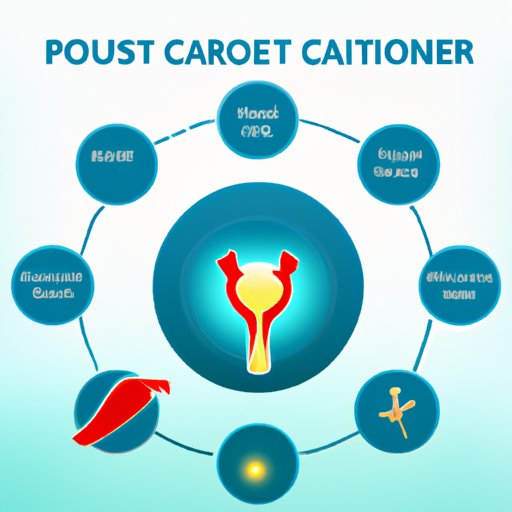
Introduction
Prostate cancer is a significant health concern among men, with over 174,000 new cases diagnosed in 2021 alone. Thankfully, effective treatment options exist to manage and even cure prostate cancer. This article will explore the various treatment options available for prostate cancer, provide tips for managing treatment side effects, examine alternative therapies, highlight recent advancements in treatment, and discuss navigating the post-treatment phase of prostate cancer.
Everything You Need to Know About Prostate Cancer Treatment
Prostate cancer treatment options include surgery, radiation therapy, chemotherapy, hormone therapy, and immunotherapy. The best course of treatment depends on factors such as the stage of cancer, the patient’s age and health status, and the severity of symptoms. For early-stage prostate cancer, surgery such as radical prostatectomy can be an effective option to remove the cancerous tissue from the prostate gland. Radiation therapy such as external beam radiation or brachytherapy is also a common treatment choice for prostate cancer. Additionally, chemotherapy, hormone therapy, and immunotherapy can be effective in managing and treating advanced prostate cancer.
Medical experts recommend working closely with a specialist to determine the best course of treatment for each patient’s unique case of prostate cancer. This may involve a combination of different treatment modalities.
Managing Prostate Cancer: Tips for Patients and Caregivers
Prostate cancer treatment can be a challenging journey for both patients and caregivers. Coping with treatment side effects such as urinary incontinence, erectile dysfunction, and fatigue can be challenging. However, patients can manage these side effects through self-care practices such as regular exercise, a healthy diet, and stress reduction activities like meditation. Support groups can also provide invaluable emotional support throughout the treatment process.
Innovative Approaches to Prostate Cancer Treatment
Emerging therapies, including gene therapy, precision medicine, and targeted radiation therapy, offer exciting possibilities for prostate cancer treatment. Gene therapy uses genes to fight cancer cells by strengthening the immune system. Precision medicine targets the specific genetic make-up of the patient and their cancer to deliver personalized care. Targeted radiation therapy shoots high-energy particles into cancer cells to destroy them while avoiding healthy tissue.
While these innovative treatments show promise, they are not yet widely available. Research is ongoing to determine the safety and effectiveness of these therapies, and patients should consult their healthcare provider to discuss the latest treatment options.
Alternative Treatments for Prostate Cancer: Separating Fact from Fiction
Complementary and alternative therapies such as herbal supplements, acupuncture, and dietary changes are often used alongside conventional treatments to manage prostate cancer. However, the research backing these treatments can be limited, and patients should approach them with caution. It is crucial to discuss any alternative treatments with a healthcare provider and weigh the potential risks and benefits against conventional treatments properly.
Navigating the Post-Treatment Phase of Prostate Cancer
Survivors of prostate cancer face unique challenges in managing the ongoing symptoms and psychological effects of treatment. Patients may struggle with anxiety, depression, and other psychological symptoms, making it essential to address mental health during the post-treatment recovery phase. Additionally, survivors may struggle to resume normal activities, but self-care measures like regular exercise, a balanced diet, and staying active can help manage symptoms effectively.
Conclusion
Prostate cancer treatment is an essential step in managing and surviving prostate cancer. Through this article, we have explored the various treatment options available, practical tips for managing the treatment process, innovative approaches to treatment, alternative therapies to explore (and avoid), and navigating the post-treatment phase of cancer. We encourage readers to work closely with their healthcare providers to determine the best course of treatment for their unique cases of prostate cancer.




